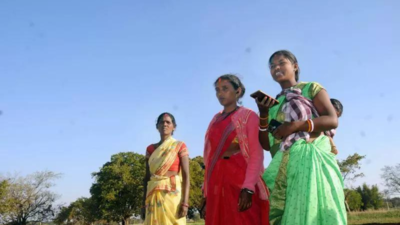ARTICLE AD BOX

New Delhi : Puja Kumari from a village near Bokaro, Ishrat from a conservative Delhi household, Simran Pandey from the capital’s workingclass lanes, and Sakshi from Jharkhand’s tribal heartland are part of a quiet but distinct shift in India’s skilling landscape.
This change is being driven by the Skill Impact Bond (SIB) — the country’s first outcome-based skilling initiative.Launched in 2021 by the ministry of skill development & entrepreneurship through the National Skill Development Corporation, SIB is backed by a consortium of philanthropic and private partners, including the British Asian Trust and the Children’s Investment Fund Foundation (CIFF) — two key organisations that helped conceptualise and fund the initiative.
Along with JSW Foundation, HSBC India and Dubai Cares, they are driving one of India’s most ambitious public-private partnerships focused on women-led growth.SIB aims to train 50,000 youth, with at least 30,150 retained in jobs for a minimum of three months. So far, over 23,700 youth—72% of them women—have been trained across 30 job roles in 13 sectors, working with more than 700 employers. Of these, 75% have secured jobs, and 60% have stayed employed for over three months — well above national averages.
As India approaches its demographic peak and eyes a $30-trillion economy by 2047, models like SIB offer a roadmap — targeted training, outcome-focused frameworks and sustained post-placement support.“We are not just experimenting with outcome-based financing—we are institutionalising it to build a resilient, inclusive skilling ecosystem,” said Jayant Chaudhary, minister of state (independent charge) for skill development and entrepreneurship.
He cited the Skill Impact Bond and Project AMBER as examples of how public, philanthropic and private investment can together deliver measurable social impact at scale.
Outcomebased financing, he added, is becoming a powerful tool to ensure public investment leads to tangible results—particularly in skilling, employment, and women’s empowerment.Puja, 26, trained as a CNC operator through Pan IIT Gurukul and moved to Chennai to work with IM Gears, becoming the sole breadwinner for her family.
Ishrat, 18, began working in Noida in a data-entry role while pursuing a BA through Delhi University’s School of Open Learning—without telling her father. Simran, 21, joined an IT training programme and now works as a customer care executive in Delhi, saving to become an air hostess.
Sakshi, 23, a school dropout from the Malto tribal community, enrolled in Pan IIT’s apparel programme in Bengaluru and now earns Rs 15,000 a month, supporting her siblings’ education.Their journeys reflect a fragile but significant transformation. Many are first-generation formal workers navigating rigid social norms, migration, and financial strain to pursue aspirational livelihoods.Jharkhand leads enrolment figures with 26% of trainees, followed by UP and Delhi. But the broader skilling landscape remains challenging still: only 4% of India’s workforce is formally skilled, and nearly 30% of trained individuals are without paid work.
Retention is especially challenging for women who have availed traditional schemes. While 84% of those enrolled under such schemes complete certification, fewer than 10% stay in jobs beyond three months.The SIB seeks to reverse this trend by tying funding not to enrolment or certification, but to job placement and retention. Training providers are incentivised to support outcomes through onboarding, counselling and alumni engagement.“Till we come out of our comfort zone, we can’t achieve anything,” says Ishrat. “At first, I wasn’t sure I could manage the machines,” says Puja, now a trainer. “Now I want girls in my village to see what’s possible.”Sakshi says her job gave her more than income, it gave her purpose. “I didn’t want my siblings to face what I did.” Simran says the job gave her confidence. “I feel I can take care of my dreams & my family’s needs too.” For them, skilling isn’t just about employment—it’s about identity, agency, and finding a place in the formal economy.



.png)
.png)
.png)
















 9 hours ago
7
9 hours ago
7








 English (US) ·
English (US) ·